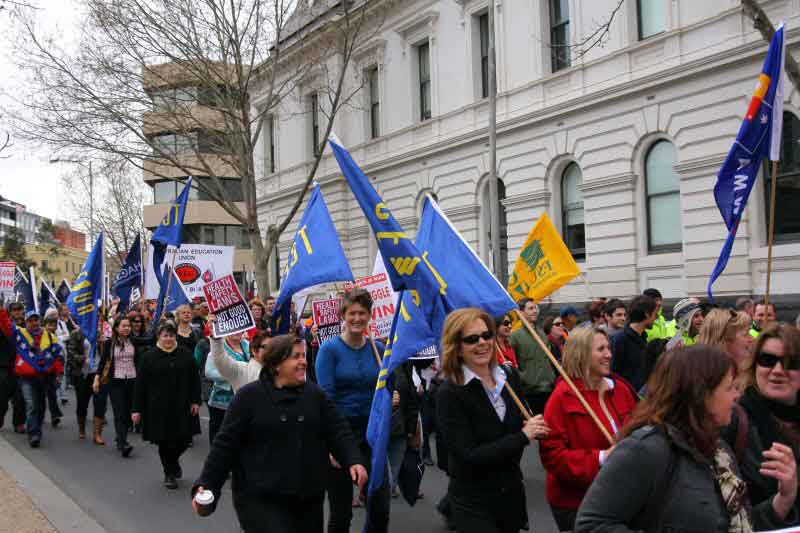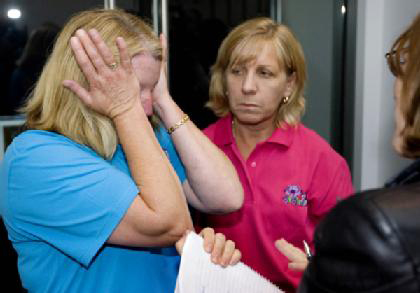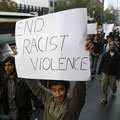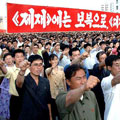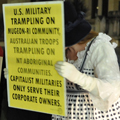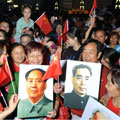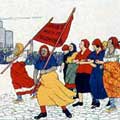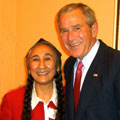Melbourne, 1 September 2009: Trade unionists at a rally to demand equal pay for women and to oppose legislative changes threatening to water down workplace safety laws. Women workers are a crucial component of the working class who can link the fight for women’s equality to the broader struggles of the powerful union movement.
4 May 2009 - Kushi is a strong, intelligent and cultured woman. She has a powerful sense of justice.
But today Kushi is suffering. She is trying to find a job in these difficult times and a place to live while at the same time bringing up on her own three young children. As just one woman, on a daily basis Kushi confronts all the different hardships and discrimination that single mothers, the unemployed and non-white migrants face in this cruel and unequal society. Kushi loves her children deeply. But her life today is one of financial difficulty, drudgery, stress, too many disappointments and depression.
Kushi (not her real name) wants her story to be told because she knows that it is a story that many, many others will relate to. Her story begins in India: the place where she grew up. In that country of extreme inequality between the haves and the have-nots, Kushi was somewhere in between but in some ways relatively fortunate. She was raised in a middle class family and was able to graduate with a Bachelor of Arts with Honours degree. She worked for eight years in the banking industry.
Kushi was a great catch for her husband and his family because of her strongly religious, socially conservative upbringing. As she explains, her “ex-husband and his family was strictly looking for a homely, religious and traditional woman who respects family values.” But in Kushi’s case, as is the norm, a man’s demand that a woman be a “strictly religious and traditional person who respects family values” was just so much hypocrisy. It just meant that the woman should be stuck at home shackled by “traditional” discipline and serving the entire joint family while the man goes out and has great fun with carefree abandon.
Furthermore, a man’s requirement that a wife be “homely” is often a code word for saying that she should be a house slave with no independent source of income. That was certainly the way it worked in Kushi’s marriage. Kushi describes a shocking incident that captures this reality. Once, when she was out of home during the day, her then husband called her on her mobile and wanted to know what she was doing outside. She joked that she was going for a job interview. He went mad and yelled that he would kill her, kill the children and kill himself if she took a job. Kushi was not alone in suffering this way. She recalls what her friend faced. Kushi’s friend was also married to an Australian citizen of Indian origin who went back to India to have an arranged marriage to a “homely” woman. When Kushi’s friend moved to Australia, the woman’s husband would literally lock her inside the house every work day to make sure she didn’t leave while he was out at work.
Kushi for her part was often required to get up very early in the morning to cook paratha for Amman and sometimes Amman’s relatives too. Paratha, sometimes known as rothi paratha, is an Indian pastry dish that requires much labour to prepare. One morning when she failed to have the paratha ready for Amman’s brother, her husband’s brother proceeded to bash her.
Physical violence is something that Kushi has experienced a lot of. Her ex-husband would beat her terribly. The bashings started in March 2003. An argument over the smallest of issues could end up in her getting beaten up. One particular beating sticks out in Kushi’s mind. It took place in 2006. Her husband sat on her and repeatedly hit her in the face. Kushi desperately yelled out to her children: “Please call for help.” Her middle daughter, then only just over four years in age, pulled at Amman’s clothes, crying, “leave mummy alone.” Then Amman rose up and grabbed the little girl and screamed at her, “I will smash you and I will kill you first.”
Sometimes when beaten Kushi would flee to a refuge centre for abused women. There she would meet large numbers of women from all backgrounds: from White Australian women to women from various non-European origins. As Kushi commented, in her own country women are subjugated but there is little pretence that women have equal rights there. But here they say that women have equality but the truth is that women are downtrodden here as well. Indeed, Kushi has experienced how much Australia’s state organs perpetuate women’s oppression. Once, some five years ago after again being beaten by her then husband she went in desperation to Merrylands Police Station. The policeman who “served” her rudely demanded, “What’s the problem?” When she described how her husband was beating her he retorted angrily, “Why do you have to upset your husband”! This took place at a police station not in Iran or Afghanistan but right here in Australia. Right here in Australia, the guardians of law and order treat women as second class citizens.
In capitalist Australia, the police, courts, prisons and bureaucracy are part of a state machine that is designed to maintain the existing unequal social order. An “order” where rich business owners are on top and working class people and the poor – especially those that are Aboriginal, women, or of non-European migrant background – are at the bottom. The personnel enforcing this system, like the police, necessarily imbibe the most extreme prejudice against the sectors of society that they keep quashed down at the bottom.
Kushi points out that the cop’s response to her plea for help was not only male chauvinist but was shaped by racism. The racism in Australia really grinds Kushi down. She explains it as a product of an unfriendly cutthroat society. “They hate each other and so they hate you (i.e. non-white people) even more.” The terrifying spate of racist attacks that Indian students have been subjected to shows the depth of bigotry that people like Kushi have to deal with every day.
November, 2008: Staff of ABC Learning Centres after a creditors meeting. Collapse of privately owned childcare company caused anguish for employees and turmoil for children and parents. Lack of free, publicly provided childcare makes it impossible for many women to participate in social and economic life or acquire financial
independence.
Slave Labour within the Family Unit
In the “traditional” family arrangement, women do unpaid work cooking and cleaning, looking after the ill and raising the children. Women are denied an adequate independent source of income. This reality both restricts women’s freedom and means that their husbands know that even if they are abusive to their wives, their wives will find it difficult or even nigh impossible to leave and make do on their own. Such a set up is often made even more unfair when the family runs a small business in which the wife participates. Such was the case in Kushi’s marriage to Amman.
Amman and Kushi operated a fairly successful family business from home in a maintenance-type field. Amman did the maintenance calls while Kushi took care of all the administration – including customer liaison, quotes and accounting. But Kushi received not a solitary cent for her work. When Kushi asked to be paid, Amman refused saying this was a “family business.” But the business remained in Amman’s name. Furthermore, he had cunningly moved the equity in their house into the business. So when Kushi and Amman later split, Amman walked away with not only the business but also with the equity in their house. Kushi, meanwhile, not only had no money to show for her toil but had no employer’s reference or record of her work that she could use to gain future employment.
After the split with Amman happened, Kushi experienced first hand how much the scales of the Australian legal system are weighted towards those with money. By paying out big money to hot shot lawyers, Amman was able to retain ownership of all the equity from their house as well as the assets of the business. Kushi, having received no pay for her labour, had little means to fight this rip-off. She had to rely on Legal Aid. But Legal Aid claimed that they could only assist with child custody matters and not with property issues. When challenged on this by Kushi, they basically fobbed her off. With limited funding and an increasing drift like every other public service towards “user pays”, Legal Aid is less and less capable of providing real support to the disadvantaged.
Most decisive has been the bias of the courts. The Federal magistrate hearing Kushi’s case has been completely unsympathetic to her plight. And that includes being unsympathetic to Kushi having received no wages for her work in her then husband’s business. Although a woman, the magistrate finds herself having much more in common with affluent Amman than with financially struggling Kushi. Recent figures show that Federal magistrates get a whopping $260,220 annual salary (The Australian, 28 May 2009) and then a whole heap of perks on top of that. Inevitably, those with such privilege have a condescending and disdainful attitude towards the poor while they see fellow well-off people as “upstanding citizens” … like themselves! What’s more, those on such a massive package as the Federal magistrates usually have considerable capital invested – either directly through shares or indirectly through private equity investments etc – in companies. In other words, they make big money not just from their own salary but from sharing the profits derived from other people’s labour. Hence, individuals like Federal magistrates are naturally empathetic towards employers that profit from workers’ labour and hostile towards employees like Kushi who demand greater payment for their work (in Kushi’s case merely any payment!) from business owners.
The Federal magistrate dealing with Kushi/Amman’s case addresses Kushi sternly while expressing “understanding” for Amman. Despite Kushi’s protests, the magistrate repeatedly postpones settling the property dispute and avoids giving any interim order on the matter, thus leaving Kushi to remain on the brink of financial ruin for longer and longer. Once, when Kushi continued to outline her desperate situation to the magistrate, the magistrate called security on her to kick her out of the court room.
To make matters worse, Amman not only does not pay Kushi any maintenance but has failed to regularly make his child support payments. When Kushi has tried to raise such matters with her ex-husband, he responds with insults like: “You are a f_cking slut sitting on Centrelink payments.” Actually, Centrelink’s Single Parent payments are woefully inadequate for a mother and her children to manage on. This means that single mothers are often at the mercy of their ex-husbands upon whom they depend for child support payments. To avoid this situation, the financial costs of bringing up children ought to be borne by society as a whole. Higher taxation of the rich should be instituted to provide sufficient funds to ensure that single parent payments are massively increased, rents are greatly reduced and that all educational costs are fully covered for – including free tuition, free school uniforms and publicly funded after school activities. But things do not work that way in this capitalist society. Here, all governmental decisions are made not according to the needs of the masses but in accordance with the desires of the very rich and their hunger for evermore profits.
Kushi’s financial situation leaves her jittery. She is unable to keep up with the mortgage repayments that she is still liable for and has already received a threatening letter from one of those ruthless banks – Westpac. The bank gave her ten days to vacate the house. Kushi is haunted by the prospect of the Sheriff showing up at her door to throw her and her children out. She is searching for rental accommodation but rents are very high and there is a huge demand for scarce places. During her last visit to some prospective accommodation, there were over twenty other people inspecting the place at the same time as her. When she does get applications in, she is confronted with various discriminatory road blocks. If the landlord or agent is racially prejudiced she may get knocked back in favour of the many other prospective tenants. On top of this, more than one Real Estate Agent has already told her openly at the time of previous applications that she would be unsuccessful because she was relying for her income on Child Support and Centrelink. Meanwhile, Kushi’s application for emergency Housing Commission accommodation was turned back because there are no available places and there is a huge queue for public housing.
Kushi knows she must find a new job. But this is easier said than done. In Sydney’s working class Western suburbs where she lives, unemployment is high. And it is female workers who have so far been among the hardest hit by the recession. The lack of accessible and affordable childcare also limits Kushi’s work options. Even with the current government rebate, childcare costs $35 a day per child (it is $52-$57 a day per child without a rebate). Unable to afford this, Kushi is searching for a job that has the hours that will allow her to look after the children after school. But she is anxious about what she will do during school holiday times. Meanwhile, her job quest is undercut by racist attitudes that devalue her Honours degree from India. So, stoically, Kushi is retraining herself: enrolling in a Diploma course through distance education.

Sinister: The men’s group called the Blackshirts. Especially active in Melbourne, the Blackshirts harass women involved in disputed Family Court hearings and intimidate divorced mothers in their own homes. Espousing ultra-conservative and fundamentalist Christian values, this fascistic group is at the extreme wing of the “family values” crusade – a crusade that is especially aimed against single mothers.
The Struggle Ahead
Today, Kushi’s situation is similar to that faced by many single mothers living in Sydney’s working class Western suburbs. Her hardships are compounded by the racist barriers she faces at almost every turn and endeavour in her life. And then there are the deep mental and emotional scars she received after having been violently abused during her marriage.
She describes her current life: “mother running with kids to Centrelink, Child Support Agency, to lawyers, to court for justice.”
Most of all she fears what her children will make of all her hardships and the depression she now suffers:
“Looking for work, dropping and picking up kids, cooking, studying with kids – all up 18 hours of work a day. Life goes on and one day she will be old soon and end up in an aged care centre because maybe her kids are not happy with their mother because they think she is responsible for all the problems in their life because they see her frustrated all the time but they don’t realise that she can only do so much ....”
However, Kushi is not one to give in so easily. She is a fighter. Kushi keeps piles of documents from the letters she has sent to parliamentarians, government agencies and other institutions about her plight. She has received little positive assistance. But one day while doing her shopping she picked up a couple of leaflets written by Trotskyist Platform (TP) – one in defence of the oppressed Palestinian people and the other exposing the continuing racist brutality of the Australian authorities. Kushi liked very much what she read so she decided to give TP a call. We told her with a heavy heart the honest truth that, unfortunately, we did not have the clout to give her immediate redress from the difficulties she faces. But we pointed out that united together with the tens of thousands of others in a similar position to her, she could be part of fighting to win gains that will make the life of working class single mothers easier. TP would like to do what we can to help plant the seeds for the development of such a movement. We stressed that for this movement to succeed it would have to be rallied together around clear political demands that will be attractive to working class people as a whole. Such demands would include the call for the provision of a school lunch to all students for free, publicly funded sports/music/hobby classes for all children for free and fully accessible childcare and for jobs for all. When the struggle for these demands is welded together with the powerful working class’ fight against exploitation then the united movement will eventually become truly invincible.
It is uncertain whether Kushi will succeed in winning a less agonising life for herself in the short term. But it is certain that if strong people like her all stand up and struggle together in a well directed way then subsequent generations will be liberated from the male chauvinism, racism, poverty and inequality that grinds down much of humanity under the outdated capitalist system today.


Trotskyist Platform: PO Box 1101, Fairfield NSW 1860, Australia.
E-mail: trotskyistplatform@gmail.com
Phone (Australia): 0417 204 611
Phone (International):0061 417 204 611

